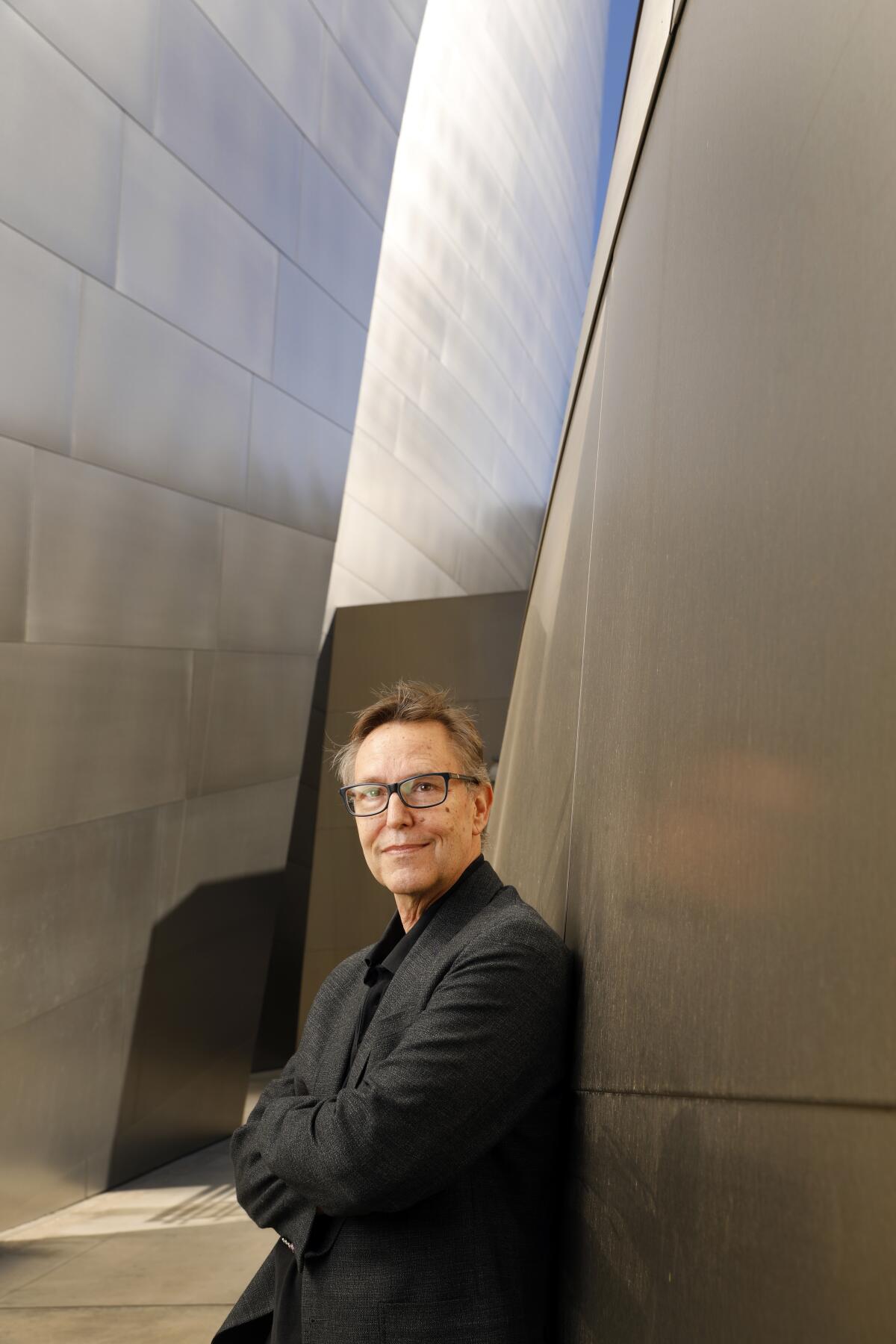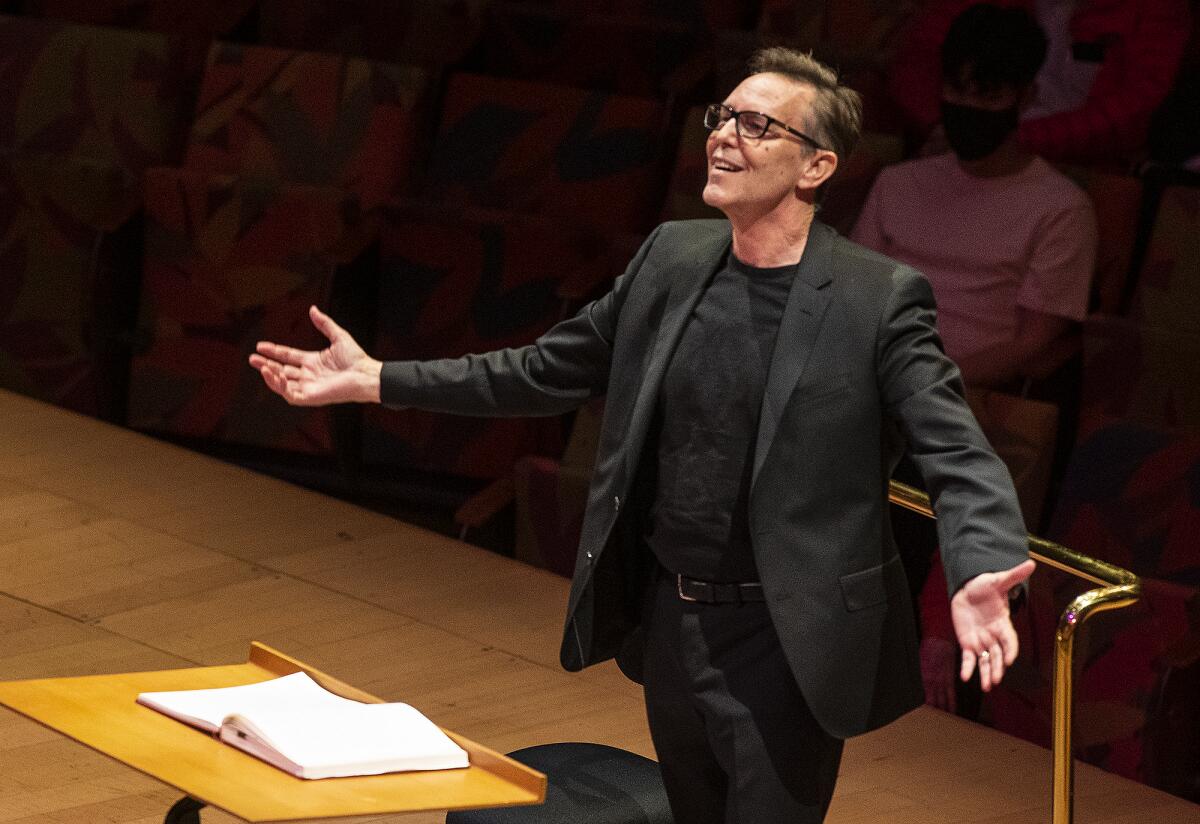How Grant Gershon made Los Angeles Master Chorale one of the country’s most adventurous choirs

- Share via
Grant Gershon has been the artistic director of the Los Angeles Master Chorale for 20 years. As he celebrates that milestone, however, it’s the future he wants to talk about, not the past.
“I really feel like the most important work — the most impactful work of the Master Chorale — is coming up,” says Gershon, sitting at a metal table in the garden tucked away behind Walt Disney Concert Hall, where the gala celebrating his 20th season recently took place.
His biggest goal going forward: to create a comprehensive youth choir where “geography and financial considerations would never be a barrier.”
Ensuring a vibrant, vital trajectory for choral music has long been key to Gershon’s vision for the Master Chorale. During his lengthy tenure, he has transformed the organization from a respected choir that performed what one longtime Master Chorale singer called “the chestnuts of the golden age of choral music” to one of the most adventurous, boundary-pushing and admired choirs in the country.
Gershon “decided to redefine the very idea of a professional choir — what it should be, and what it could be,” says former Los Angeles Philharmonic music director Esa-Pekka Salonen, who inspired Gershon to take up conducting after the pair worked together in 1992 at the Salzburg Festival. There, they collaborated with opera and theater director Peter Sellars on his staging of Olivier Messiaen’s opera “Saint François d’Assise.”
Gershon, who served as a rehearsal pianist and vocal coach for that project and refers to Salonen as his mentor, has “boundless artistic and musical curiosity,” Salonen notes. Gershon later went on to become Salonen’s assistant conductor at the L.A. Phil, subbing on his own for the very first time when Salonen’s wife went into labor with the couple’s second daughter, Anja Sofia.
“It was insane. It’s the kind of thing that would never happen nowadays because there’s so much more structure,” says Gershon. “But they put me up there.”
Gershon continued to learn from Salonen and the L.A. Phil, occasionally working with the Master Chorale, before briefly moving with his wife, Elissa Johnston, to New York City. He returned to his home turf in 2001 when the Master Chorale hired him to succeed Paul Salamunovich, who had served as music director since 1991.

Under Gershon’s leadership, the Master Chorale has staged 45 world premieres and made 38 commissions of original music, says Jean Davidson, Master Chorale president and chief executive. It has also transformed from a largely volunteer-based organization to one that boasts 100 professional member singers represented by the American Guild of Musical Artists.
“That Grant believes in contemporary composers with a commitment to risk-taking is gradually expanding the canon of choral music to be more inclusive,” says Davidson.
The chorus is increasingly talking about diversity, integration, inclusion and access, says associate artistic director Jenny Wong, and has made a point to feature singers from a wide variety of backgrounds and ethnicities. Two years ago, the chorus committed that 50% of their future programming would elevate work by composers from historically underrepresented groups in classical music, including people of color and women.
“In the last four years, I’ve sung in more languages than I ever did in my entire career, and that’s exciting,” says singer Amy Fogerson, who has been with the Master Chorale for 35 years.
Fogerson adds that Gershon arrived with a broader knowledge of modern music than the two previous conductors. “He also knew artists like John Adams and brought them into the Chorale. For me it’s like opening a new present on Christmas Day to be working in that kind of collaborative environment.”
Audiences have responded positively to Gershon’s innovation and sense of artistic adventure, says Davidson; that’s partially why the organization’s budget grew by 99% from 2006 to 2019. The budget is projected to stand between $10 million and $12 million in the next two to three years, Davidson adds, noting that the Master Chorale also managed to weather the pandemic without furloughing or laying off a single staff member.
Longtime friend and colleague Sellars, who collaborated with Gershon and the Master Chorale on a critically acclaimed interpretation of late-Renaissance composer Orlando di Lasso’s “Lagrime di San Pietro,” calls Gershon the “most musical person” he’s ever met. Sellars says Gershon has an innate ability to pick out a core melody in any piece of music, no matter how challenging or complex. Calling it “an uncanny gift from some cosmic source,” Sellars says Gershon is also unique for not letting his talent go to his head.
“Grant has never stood on a podium to impress anyone,” Sellars says. “All he wants to do is make music. He never says, ‘I’m here, the great personality has entered the room.’ Grant is more interested in everyone else in the room than he is himself.”
In interviews with those who have worked closely with him, Gershon’s sense of humility and quiet integrity is mentioned time and again.
Sellars recalls that when they were working on “Lagrime di San Pietro,” Gershon would walk around the performance space in his stocking feet. He’d appear “wherever a performer needed him” and disappear just as quickly when they didn’t, Sellars says.
Grant Gershon keeps a steady beat
Singer Edmond Rodriguez, who began working with the Master Chorale after graduating from USC, right before the pandemic, recalls feeling deeply supported by Gershon when he was new to the group. In November 2021, Rodriguez was asked to sing the tenor solo in the fifth movement of Rachmaninoff’s “All-Night Vigil.” Rodriguez says he found the prospect challenging and wasn’t sure he could achieve the results he personally wanted.
“Grant was so kind and gentle as he guided me through that,” says Rodriguez, adding that Gershon would look him in the eye and encourage him to trust his voice.
Wong, who was hired in her current assistant conductor position in 2020, calls Gershon a “gentle, humble human.” “There is so much generosity and grace in the way he interacts with people,” Wong says. “Having Grant believe in me makes me believe in myself.”
She also says that it’s a running joke at the Master Chorale that Gershon has “magic ears.” “If there are 32 parts, he can pick up the one wrong note,” she says, adding that he doesn’t just listen to the music. Gershon listens to the perspectives of others. He also has incredibly diverse taste in music, which comes across in the Master Chorale’s programming, she says.
“He’ll discover things less familiar to himself, and less familiar to our audiences, and he’ll find a way to present it in an integrated way that has context,” Wong says.
Gershon was born in 1960 and grew up in Alhambra. His father worked with Social Security and his mother was a piano teacher. Gershon began taking piano lessons when he was about 4 or 5. He joined the choir at Alhambra High School during his freshman year, working first as an accompanist and later joining the tenor section after breaking his arm and losing his ability to play piano for a year.
That summer, his parents shipped him off to a choir program at a music camp in Idyllwild. His mind was blown. “It was both the music itself, and then also being part of a community of friends and fellow music geeks — just finding your tribe,” Gershon says.
He double-majored in piano and voice at Chapman College and transferred to University of Southern California, where he also sang in the choir. After graduation, he gigged around town, including a stint at the top-floor bar at L’Ermitage Beverly Hills. “It was only open to guests and club members, which basically meant that most nights there was just nobody there,” says Gershon. “So I was just playing for the bartender or myself.”
But every once in a while, he says, someone big would come in: Stevie Wonder, Cyndi Lauper or Martin Scorsese.
Gershon began his professional career as a rehearsal pianist for Los Angeles Opera when it first formed in 1986. It was during this period that Gershon began meeting people like Sellars and Adams, relationships that would help form the core of who he would become as a conductor and artistic director of the Master Chorale.
Looking back on those days, Gershon is amazed at the organic way his path unfolded. He credits those around him more than he credits himself for his success. Those same people cite Gershon’s influence on their own lives as pivotal.
“I hope I grow up to be like Grant,” says Wong, laughing. “I’m constantly asking myself in any situation, ‘What would Grant do?’ And that’s a big inspiration moving into the future.”
More to Read
The biggest entertainment stories
Get our big stories about Hollywood, film, television, music, arts, culture and more right in your inbox as soon as they publish.
You may occasionally receive promotional content from the Los Angeles Times.











